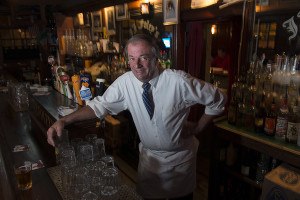Farm Sanctuary's 25th Anniversary Dinner
Animals are people, too. That’s the message spread by the Farm Sanctuary, an organization dedicated to combating the cruel conditions of factory farms and giving safe haven to sick or mistreated farm animals. Farm Sanctuary was founded in 1986 when president and CEO Gene Baur started selling veggie hot dogs out of his VW van at Grateful Dead concerts; today, the organization has preserves in California and New York, has saved more than 10,000 animals, and has a dedicated following that includes celebrities like Jesse Eisenberg and Kim Basinger.
Chowder attended Farm Sanctuary’s 25th-anniversary dinner on Sunday to nosh on vegan eats by Cambridge-based farm-to-table caterers Season to Taste (think: sweet-potato latkes with grilled-pear-and-chipotle salsa, and tiny tarts filled with homemade strawberry preserves). In between bites, we chatted with Baur about the cause, the diet, and the little steps that can make a huge difference.
How did you get into the animal rights movement?
I grew up in LA and didn’t have a lot of experience with farming. I wanted to know firsthand what was happening to animals on farms, so I started doing some investigation. I found living animals left in trash cans or on piles of dead animals, and I wanted to do whatever I could to address and prevent the problem. We started taking the animals to a rowhouse in Wilmington, Delaware, and neighborhood kids came around and wanted to hear their stories. They became animal ambassadors who could educate people.
What’s it like on the sanctuaries?
We always say it’s a sanctuary for animals and for people. It’s a beautiful green farm; the animals have their own spaces and can develop relationships with one another — cows sometimes hang out with sheep, and so on. We welcome thousands of visitors every year, and people can actually get in there and interact with the animals, but it’s not a petting zoo. If you’re visiting, you’re a guest in their home, and we’re very mindful of making sure that they don’t get overly stressed.
What’s the goal of outreach events like this weekend’s dinner?
We want to inspire people to stay active and to do as much as they can to make a difference by supporting Farm Sanctuary through donations, but also through making lifestyle choices. We recognize that everyone has to make their own decision, but we want them to make informed decisions. People are unwittingly supporting factory farming cruelty, and when these issues come up, they look the other way. Choosing what we eat is probably one of the most important decisions we make every day, and people don’t think enough about it.
You’ve been a vegan since 1985 — is there any animal-based food you miss?
I grew up like most people eating meat, milk, and eggs, and as a kid, I actually did commercials for McDonald’s. But going vegan was easy for me. I started eating a lot of different ethnic foods I hadn’t tried before — Ethiopian, Chinese, Mexican, Thai. Historically people have eaten primarily plant foods; it’s a fairly recent development that we eat so many animals. When we’re eating food that’s high in animal products, it tends to negatively impact our health — there’s no fiber, and it’s high cholesterol.
A lot of people seem to have the impression that vegan food is just bland tofu and sprouts.
You can get very decadent vegan food if you want. There was even a vegan cupcake maker who won [Food Network show] Cupcake Wars! Vegan food is as good as any other in terms of taste, texture, and gustatory satisfaction. Your taste buds adapt, so you start appreciating more simple things, rather than a lot of salt or fat.
What if I’m not ready to go the whole hog and give up meat entirely?
One day a week, try a vegan menu. Try substituting soy milk instead of cow’s milk on your cereal. If you can’t go vegan 100 percent of the time, try eating vegan 10 percent of the time. Like all animals farm animals have feelings and deserve to be treated with respect and compassion. We encourage people to think about how they eat, because our food choices have a profound impact.


